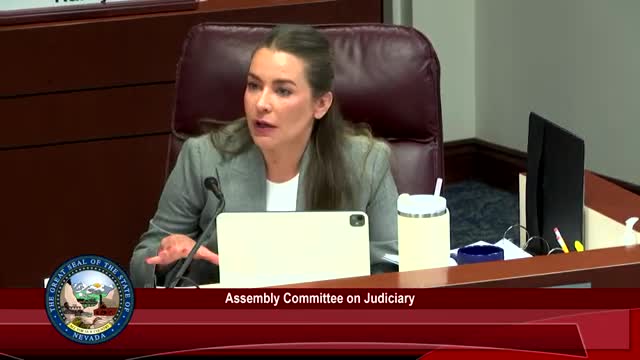
This article was created by AI using a video recording of the meeting. It summarizes the key points discussed, but for full details and context, please refer to the video of the full meeting. Link to Full Meeting
Assemblywoman Britney Miller, who sponsored the bill, shared a deeply personal anecdote about her father, a teacher who faced repercussions for including Holocaust-related materials in his curriculum. This experience shaped her commitment to ensuring that students have access to a wide range of literature, regardless of its controversial nature. "This bill is very personal to me," she stated, emphasizing the need for legal protections against censorship.
The discussion centered around the "Miller test," a legal standard used to determine what constitutes obscenity. Assembly members raised questions about how community standards might differ across educational levels, from elementary schools to high schools. Miller clarified that while community standards vary, the bill would not restrict librarians from making age-appropriate recommendations. "We can still have discretion to advise and to shelve where it's appropriate," she explained.
Support for AB 416 came from various stakeholders, including educators, civil rights advocates, and parents. Brian Wallace, representing the Nevada State Education Association, highlighted the role of school libraries in fostering critical thinking and inclusivity. "Restricting materials limits their ability to think critically and form their own opinions," he argued, calling for the protection of diverse perspectives in educational settings.
Testimonies from individuals like Kayla Maesse from the ACLU and Bridal Schmidt from Silver State Equality echoed the sentiment that access to diverse literature is essential for all students. They warned against the chilling effects of censorship, which can create an environment of fear and limit students' exposure to different ideas and experiences.
As the meeting progressed, several speakers shared their personal experiences with literature and its impact on their lives. They emphasized that reading diverse stories fosters empathy and understanding, allowing students to connect with others and navigate complex social issues. "No child should leave a library feeling unseen," Schmidt remarked, reinforcing the bill's goal of ensuring representation in literature.
The committee members listened intently as advocates urged them to consider the broader implications of book bans and censorship. They argued that such restrictions not only harm students but also undermine the very foundation of democracy by limiting access to information and diverse viewpoints.
As the meeting concluded, the call for support of AB 416 resonated strongly among participants. The bill aims to protect the rights of librarians and educators while ensuring that students have the freedom to explore a wide array of ideas through literature. With the future of intellectual freedom in education at stake, the discussions in this meeting highlighted the critical need for legislative action to uphold the values of diversity and inclusion in Nevada's schools.
Converted from 4/8/2025 - Assembly Committee on Judiciary meeting on April 08, 2025
Link to Full Meeting
Comments
View full meeting
This article is based on a recent meeting—watch the full video and explore the complete transcript for deeper insights into the discussion.
View full meeting

